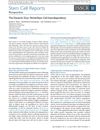Reduced SMAD2/3 Activation Independently Predicts Increased Depth of Human Cutaneous Squamous Cell Carcinoma
February 2018
in “
Oncotarget
”
TLDR Lower SMAD2/3 activation predicts more severe skin cancer.
The study found that reduced activation of SMAD2/3 independently predicted increased depth and severity of human cutaneous squamous cell carcinoma (cSCC). Analysis of 249 tissue samples revealed that lower levels of phosphorylated SMAD2 and SMAD3 were significantly correlated with thicker and more invasive tumors. These findings suggested that SMAD2/3 could serve as potential biomarkers for assessing the aggressiveness of cSCC, supporting the hypothesis that TGF-β signaling acts as a tumor suppressor in cSCC. The research highlighted the need for further investigation into TGF-β signaling pathways in cSCC progression.







